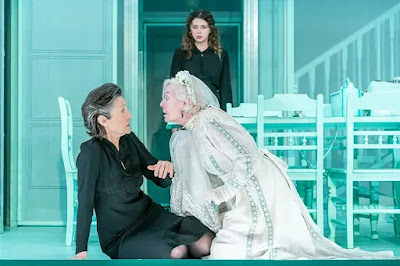The House of Bernarda Alba
The laughter as people made their way out of the auditorium could have led you to believe that we had come out from a comedy, but instead it was that laughter of relief you get after surviving a traumatic experience.
We didn’t get off to a great start as a couple of big guys with big heads sat down in front of us, so our view was a bit punctuated by shuffling about to see properly. I was sort of hoping they wouldn’t come back for the second half but they did. Actually the second half was so gripping I hardly noticed it any more.
After the death of her husband, Bernarda locks her daughters and her own mother in the house for an eight year period of mourning. I gather the original version was written during the Spanish Civil War and whatever way you look at it this is a pretty effective play about tyranny, but making this a female cast (except for the dancing and wordless Pepe El Romano, played by a muscular James McHugh*) added an additional layer. The women are locked into being daughters, wives and mothers, while being kept from actually fulfilling those roles. The active collaboration of the women in ensuring that they are all kept in check and as miserable as each other was pretty chilling, even participating in punishments for stepping out of line.
Directed by Rebecca Frecknall, fresh from the amazing Streetcar Named Desire from earlier this year, I liked the use again of slow motion for some of the violence, but where Streetcar was intimate and without any set to speak of, the set here was vast and cold against the passions within. The first half was quite overwhelming in the amount going on, in terms of the various overlapping dialogues and narratives, but also the activity on all three floors of the impressive set, all in a sort of bilious mint green, except for the gun placed prominently and ominously on the wall. It looks more like a prison than a home, with each person in their own cell. The second half focuses much more on the main traumatic (and also pretty melodramatic) storyline and so it suddenly got a lot easier to follow and more emotionally engaging too.
However much Bernarda (played implacably by Harriet Walter) might say and whatever her motivations, her cruelty ensures everyone stays in line and nothing changes despite her family twisting around trying to find better ways to live, Bernarda’s certainty that she is right and knows everything does not in the end protect her or her family; in the end she fails spectacularly. Of course Harriet Walter was impressive and actually quite scary, although I would have liked to have heard a bit more from her. But Rosaline Eleazar did a great portrayal of the abused Angustius as someone just tired of everyone's shit and wanting a quiet life. And Isis Hainsworth was both over the top and impressive as the passionate Adela. An honourable mention to Eileen Nicholas too, as the strange mother frequently escaping from the attic; I felt a kinship! I didn't quite get why everyone, including the ramrod straight Bernarda, was so free with the f-word though, I'm always happy with a bit of swearing but it felt a bit odd in places, unless it was highlighting the obsession that all of the family had in their different ways with sex?
So what did we learn? Well I took that being an ally is important, and that standing up for what is right matters - the women would have had much better lives had they stood together. Also an important point though was that the NT needs to get their ice-creams out of the freezer about 5 minutes earlier, as evidenced by a splintered wooden spoon after trying to chip through a solid block of ice.
I felt pretty tired by the end, but an interesting evening all the same.
*Dancers seem to be a bit of a thing this year to enhance emotional depth, having seen something similar in both A View from the Bridge and Dr Semmelweis, and I am there for it.

Comments
Post a Comment